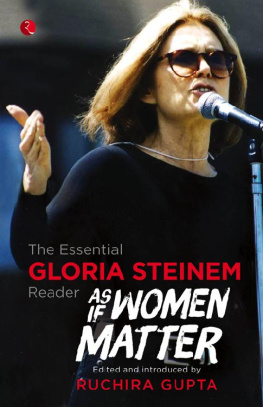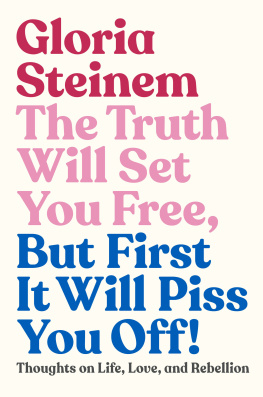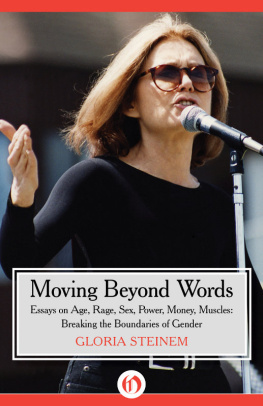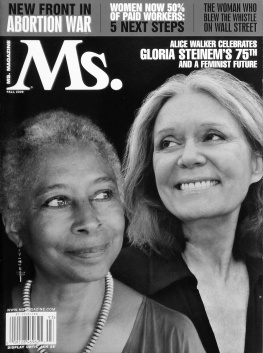Born on 25 March 1934 in Toledo, Ohio, Gloria Steinem is a writer, speaker and organizer whose work has been an organic part of the feminist revolution in the United States and other countries for the last forty years. She has been especially concerned with exploring the linkages between gender and race, caste and class, and between gender and violence. Gloria began her career in journalism and went on to co-found the New York and Ms . magazines. The latter is the only nationally distributed magazine for women which is owned and controlled by women.
Glorias wide-ranging concerns and her passionate, insightful and witty voice are the hallmarks of her writing. Her essays have been collected in anthologies such as Moving beyond Words: Age, Rage, Sex, Power, Money, Muscles: Breaking the Boundaries of Gender (1995), Revolution from Within: A Book of Self-Esteem (1992) and Outrageous Acts and Everyday Rebellions (1983). In addition to being a prolific writer, Gloria is a board member of Equality Now, a global human rights group for women; and a co-founder and board member of the Womens Media Center, whose purpose is to name and change media bias against women. She is also the Chair of Apne Aap Women Worldwide, a grassroots anti-trafficking organization in India.
In recognition of her work and her achievements, Gloria Steinem was awarded the Presidential Medal of Freedom by Barack Obama in 2013
*
Ruchira Gupta, Founder-President, Apne Aap Women Worldwide, is an Emmy-winning journalist, feminist-activist and policymaker who has worked for thirty years to end human trafficking and empower marginalized women. She is also a Professor at New York University where she teaches the course, Human Trafficking as Gender-Based Violence, once a year.
Ruchira received the Clinton Global Citizens Award in 2009.
Published by
Rupa Publications India Pvt. Ltd 2014
7/16, Ansari Road, Daryaganj
New Delhi 110002
Sales centres:
Allahabad Bengaluru Chennai
Hyderabad Jaipur Kathmandu
Kolkata Mumbai
Text copyright Gloria Steinem 2014
Introduction and edition copyright Ruchira Gupta 2014
Page 275 is an extension of the copyright page.
eISBN: 9788129134110
All rights reserved.
No part of this publication may be reproduced, transmitted, or stored in a retrieval system, in any form or by any means, electronic, mechanical, photocopying, recording or otherwise, without the prior permission of the publisher.
This edition is for sale in India, Nepal and Bangladesh only.
Typeset in Nebraska by SRYA, New Delhi
This book is sold subject to the condition that it shall not, by way of trade or otherwise, be lent, resold, hired out, or otherwise circulated, without the publishers prior consent, in any form of binding or cover other than that in which it is published.
To my lifetime friend,
Devaki Jain,
and to
Kamaladevi Chattopadhyay,
who inspired us both
Gloria Steinem
*
To my mother, who taught me to ask questions,
to my father, who taught me to look for answers in Movements,
and to Jyoti Singh Pandey,
whose courage is contagious.
Ruchira Gupta
CONTENTS
PREFACE
This book exists because my friend and colleague, Ruchira Gupta, thought that some of my writings over the years might be useful to the many women and men in India who are working for more empathy and equalityand far less violencebetween women and men.
I hope with all my heart that you find some helpful fact or idea or companionship in these pages. My country, too, needs to bridge the distance between female and male human beings, and between masculine and feminine tasks that are really all human. Roles based on ideas of gender may be no more humane or inevitable than those based on race or caste or class or anything else that isnt earned or chosen.
Indeed, Ive come to believe that the independent masculine and the dependent femininesubject and object, active and passiveare just labels for universal human qualities. They may normalize in equality based on sex in the same way that stereotypes do for race, caste, class and other invented divisions.
But the important thing to remember is that female bodies are the means of reproduction, and so are doubly likely to be restricted when other divisions are at stakewhich is why sexism and racism are so intertwined in my country, sexism and caste are so intertwined in yours, and why sex/race or sex/caste can only be uprooted together.
In most cases, gender inequality is what we experience first as children in our families, so we feel that those roles are natural, even good, and the domination of one gender by another seems normal. Even if we find such sex inequalities deplorable, we often think they are inevitable. After all, if we accept inequality within our own home and among the people we love, well accept it anywhere. But in the years when I was writing the essays in this book, studies of tribal societies were already proving that polarized gender roles were the best indicator of other forms of violence within that society, and also of the likelihood that it would use violence against outsiders. Anthropologist Geoffrey Gorer had shown that rigid sex roles characterized violent cultures, and a lack of sex-role rigidity characterized non-violent cultures.
Since then, Sex and World Peace , a 2012 book by Valerie Hudson and three other scholars, has documented current rates of violence against females in a hundred nations. It also documented rates of poverty, access to natural resources, degrees of democracy, and the influence of religion on the law. The best predictor of violence within a countryand also of a countrys willingness to use of violence against another countrywas none of the usual suspects of poverty, natural resources, religion or democracy. It was violence against females .
As the authors explain: Those states that foster gender equality through laws and enforce those laws are less likely to go to war. They are less likely to use force first when in conflict States do go to war over oil and scarce resources, among other things, but they are more likely to do so if the society has norms of violence rooted in gender inequality
And if youre wondering where my country came out, it wasnt so great. As one of the few modern nations with no guarantee of womens rights in its Constitution, no national system of childcare or parental leave, no ratification of the Convention on the Elimination of All Forms of Discrimination against Women, and with high rates of maternal mortality, the US tends to let women fend for ourselves rather than guarantee rights. For instance, the womens movement worked long and hard to make domestic violence a crime, yet its very under-prosecuted, rarely taken seriously enough to be prevented, and shelters are disappearing with budget cuts. Yet if you added up all the women whove been murdered by their husbands or boyfriends since 9/11and then added up all the Americans killed in 9/11, in Iraq and in Afghanistan combined more women have lost their lives to domestic terrorism.
As Hudson and her co-authors wrote as a challenge: You were taught that the clash of civilizations is based on ethno political differences, but did you know that the real clash of civilizations may instead be based on gender beliefs?
*
Now, even more than when I wrote these essays, I understand why I wrote them. For instance, I look back on my research into Hitlers obsession with masculinity, and I see a gendered understanding of violence in the making. I re-read The Politics of Food , and think about genetically altered seeds and farmers in India committing suicide.











